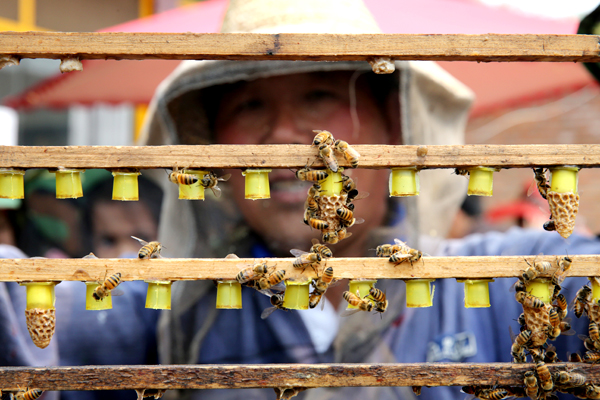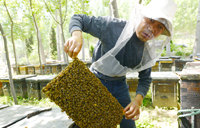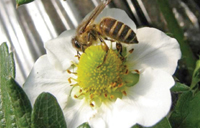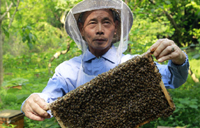Honey, it's all organic
Updated: 2013-10-24 10:47
By Sun Ye (China Daily)
|
||||||||
 |
|
Song Xuezhou shows how to make bee milk. [Photo by Jiang Dong/China Daily] |
Being a beekeeper is more than just gathering liquid amber when the hives are full, It is making sure colonies of bees are getting along, and that the little insects are happy and contented. Sun Ye talks to suburban honey gatherer Song Xuezhou.
Beijing is not all about urban high-rises, historical sights and gridlocked traffic producing alarming levels of high particulate pollution. It is, fortunately, also home to a growing group of people who are dedicated to producing good, wholesome food that is safe from pesticides and chemical fertilizers.
In the outer suburb of Tongzhou, Song Xuezhou is one of a number of honey gatherers who roam the countryside so their bees can produce honey that is "pollution-free and all natural".
The 60-year-old retired welder has just returned from gathering caragana honey in the Renjianhuahai mountain area in suburban Miyun county. This year, he took about 70 beehives with him, driving a truck into the mountains with a tent, a tank of gas, a supply of rice and noodles and other daily necessities. He stayed for a month.
Song pitched camp away from the nearby village for fear that his bees would become agitated and sting people. He also made sure he was at least a few kilometers away from other honey farmers so there would be plenty of nectar to go around.
"A villager would send water up to me and I sometimes bathed in the river," Song says. "It's difficult living up here."
But he usually has little time to dwell on the inconvenience. The flowering season in July is very busy, with the day starting at 5 am.
"You have to extract the honey before the bees begin working. They are diligent workers themselves."
Bees constantly fly back and forth between the camp and patches of flowering caragana shrubs, and each hive produces about 40 kg of honey each season.
An experienced beekeeper has a trick to motivate the bees even more.
"The secret is to leave the right amount of honey in the hive - not so much so that the bees stop working but enough so they know you are pleased with their work."
Song also monitors the well-being of each little colony.
"I watch if the queen bee gets challenged, and watch to see who could take its throne, who's thinking of splitting the colony, which bees are going on strike and which bees have the stronger genes.
"It's natural selection," he says. "And I get to know them from my years of experience."

 Post-baby Duchess
Post-baby Duchess
 Victoria Beckham S/S 2014 presented during NYFW
Victoria Beckham S/S 2014 presented during NYFW
 'Despicable' minions upset Depp's 'Lone Ranger' at box office
'Despicable' minions upset Depp's 'Lone Ranger' at box office
 'Taken 2' grabs movie box office crown
'Taken 2' grabs movie box office crown
 Rihanna's 'Diamonds' tops UK pop chart
Rihanna's 'Diamonds' tops UK pop chart
 Fans get look at vintage Rolling Stones
Fans get look at vintage Rolling Stones
 Celebrities attend Power of Women event
Celebrities attend Power of Women event
 Ang Lee breaks 'every rule' to make unlikely new Life of Pi film
Ang Lee breaks 'every rule' to make unlikely new Life of Pi film
Most Viewed
Editor's Picks

|

|

|

|

|

|
Today's Top News
US, China broadband companies join forces
Chinatown restaurants learn how to get an 'A'
Snuff bottle 'gems' on display at Met
Beijing airport set to become world's busiest
US firms urge easier process for investment
EU to hold talks with US over spying
Wal-Mart plans to open 110 new stores
China calls for strengthened EU ties
US Weekly

|

|










